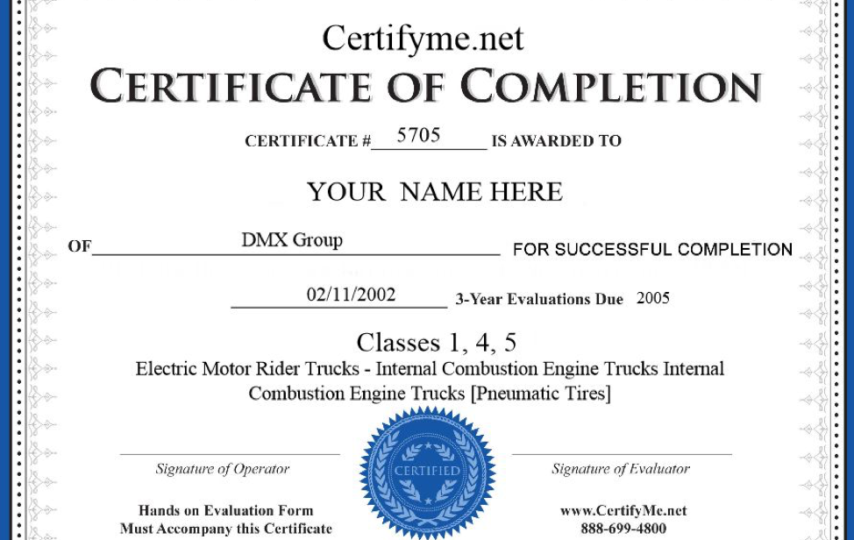Forklifts are crucial machines in warehouses and manufacturing plants worldwide, allowing workers to quickly and efficiently carry large loads.
Operating a forklift with no proper training and certification can be dangerous to you and your coworkers and anyone in the surrounding area.
It’s essential to understand the proper way to operate a forklift to protect yourself and everyone around you from injury and harm.
This article guides everything you need to know about forklift training, including what it entails, do forklift operators need training, and more.
How Does Forklift Training Work?
When you first start working with a forklift, it may seem overwhelming because so many things need to be done in a correct way to avoid any potential accidents.
For example, the operator should know how to use the controls correctly and the vehicle’s steering system. In addition, they should know how to safely operate the vehicle’s forks during operation, which includes keeping them from hitting people or anything else while driving on roads or floors where people work or live. If operated incorrectly, they can cause injuries and even death.
The training program for forklift operators typically lasts about ten weeks and is offered by vocational schools that specialize in truck driving or industrial machinery.
Why Forklift Training?
Again, there comes the question, why do forklift operators need training? Forklifts are very dangerous, but they can help save hours in moving products into storage areas or between floors of a warehouse or factory when appropriately used. All forklift operators require extensive training for the optimum and safe operation of the forklifts.
But that’s not all, here are some more reasons.
- There are safety risks associated with a forklift.
- There are legal implications.
- There are quality considerations.
- There are supply chain threats.
Bonus: Forklift certification training may also provide you with additional job opportunities if employers are looking for someone with specific skill sets related to operating heavy machinery like forklifts.
How Can They Be Dangerous?
Of all industrial equipment, forklifts have had more deaths and severe injuries than any other piece of machinery.
In 2017, 9,050 nonfatal workplace injuries or illnesses involving forklifts were reported by employers, not to mention 74 fatal wounds caused in the same year. The injuries result in loss of person-hours due to workers taking leave for recovery. The median leave days last up to 13 days more than the average of eight days.
Though they have been made safer over time, forklifts can still be incredibly dangerous due to their unpredictability. They are prone to running off a dock or falling from an elevation. In addition, many safety features are disengaged once a forklift is being used, which is why it’s so essential for proper training and certification before using them regularly.
How to Use Them?
Using a forklift can be a tricky business, especially if you’re new to them. They are heavy machinery, after all, and should be treated as such. Because of their size and weight, they are potentially dangerous—especially in inexperienced hands. To get started using one, you’ll want to make sure that your workplace is forklift-friendly. This means making sure that you have enough space for your equipment.
Don’t try to fit a large piece of machinery in a small area, no matter how safe it might look. It also means getting any necessary clearances from local government officials. While some sites don’t require special permits or certifications, others do; it pays to check first! Your next step will be learning how to use one safely and correctly.
Things to Consider Before Starting Certification Training
Although until now, you might have got the answer to the question, “why do forklift operators need training?” and decide to connect with a vocational school or agency for employee training, before you sign in to any training program, here are a few things to consider.
- Picking the right course.
- Considering employee experience and safety.
- Choosing a schedule that works for everyone.
- Differentiate between initial and recurrent training.
- Delivery method and options.
- Training and certification combined or separate?
Safety Precautions During Training
While on course, instructors will test whether you’ve internalized these five critical safety precautions.
- Never place both hands off your steering wheel
- Avoid excessive speed
- Make sure all containers are loaded correctly
- Be aware of nearby pedestrians
- Keep an eye out for fellow forklift operators who may need help.
In the End
Forklift certification can help businesses save money by reducing injuries and injuries-related expenses such as workers’ compensation claims, medical bills, and missed work time. Another way that forklift certification can help is by increasing the productivity and efficiency of the company’s workforce.



